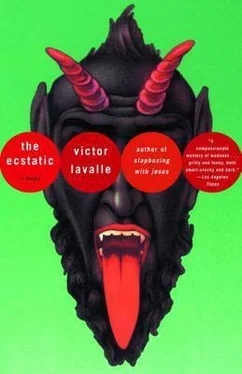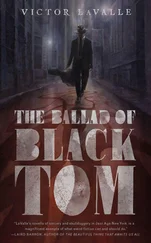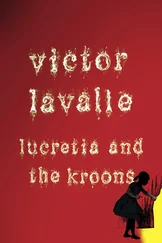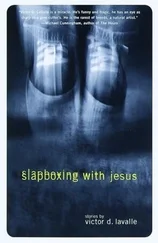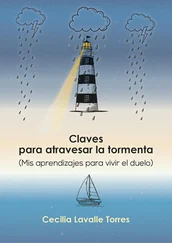TO VIRGINIA SMITH,
a great writer, editor, and human being.
Who knew anyone could be all three?
Underneath it all I hear pan pipes tooting and a cloven hoof beating time.
— JOHN FAHEY
Acclaim for Victor LaValle’s THE ECSTATIC
“[The] characters are as beautifully rendered as they are bizarrely believable…. LaValle… writes prose that hums in your ear and appeals to your intellect.” — The Washington Post Book World
“One of the funniest, darkest novels of the year. . A gracefully funny, character-driven, black comedy of manners.” — New York Post
“In the majestic tradition of William Faulkner, Victor LaValle has created, with love apparent, a singular cast of crazies, con men, and beauty queens out for their piece of the pie. This quest is a rollicking laugh-out-loud wild ride, but be warned: It is punctuated with stunning grief and mournful beauty. The Ecstatic is a jubilant American novel.” —Binnie Kirshenbaum, author of Hester Among the Ruins
“A domestic drama. . that might have been conceived by Ice Cube and Fellini.” — Time Out New York
“The characters are messy and complicated…. LaValle renders them raw and real, but with sustained doses of humor to take the edge off.” —The Washington Post
“Possessed by Kafka, Carver, and the Notorious B.I.G., this is a tale of the new millennium American experience, grotesquely captured in a prose so crisp that it cuts to the core before you can blink. LaValle exposes our absurdity — clinical and otherwise — with all its hilarity, eroticism, violence, and horrific beauty.” —Willie Perdomo, author of Where a Nickel Costs a Dime
“An auspicious first novel that ranges with obsessive-compulsive precision over the same pulpy patch of black-geek meta-culture that Colson Whitehead. . attacked with The Intuitionist . . A daring performance.” — Black Issues Book Review
They drove a green rented car into central New York State to find me living wild in my apartment. Wearing shattered glasses and my hair a giant cauliflower-shaped afro on my head. I was three hundred and fifteen pounds. I was a mess, but the house was clean. They knocked and when I opened the front door there were three archangels on my stoop. My sister rubbed my ear when I cried. She whispered, — Why don’t you go put on clothes?
My family took me home to Queens and kept me in the basement. When I tried to go outside alone, they discouraged it. My sister led me by the hand when walking to the supermarket. Mom cut my meat at the dinner table. They treated me like what some still refer to as a Mongoloid. A few days of this is tenderness, but two weeks seems more like punishment. The spirit of blame stooped in a corner.
Their concern was wonderful, but the condescension was deadly. And surprising. Before opening the front door to them I really thought my life was full of pepper.
Three weeks after coming back to Rosedale I cooked a big, red breakfast for my family just to prove that I could. Not only to them, but to myself. It was September 25th, 1995. I remember certain dates to organize and understand my disaster. Without them my mind is a mass grave.
It was a red breakfast because I added ketchup to the eggs when scrambling them. And to the bacon as it curled in the pan. Call me tasteless, but ketchup is the only seasoning I need.
I was so nervous that I even dressed up that morning. This bright purple suit that was loose on me and hid my tits. Made me look like a two-hundred-fifty-pound man.
Our oven was so hot I had to watch I didn’t sweat into the food. Wiped my forehead with my tie. I pulled butter from the fridge to set next to a plate of toast and if this didn’t make them happy then I was out of ideas.
But they didn’t appear. I waited a long time.
Even though I heard their beds creak then footsteps on the floor, they never came around the corner. It was like they turned to dust. I prodded the bacon, but without enthusiasm. There was no sizzle yet. With my left hand in my pants pocket I hoped to look cool. I counted numbers to keep from fidgeting.
I turned the gas flames lower. I washed dishes left in the sink overnight and put them in high cabinets. Sunlight addressed the windows.
Worst of all fears is abandonment. Eventually I had to know where they’d gone. The white linoleum tiles ticked against the undersides of my dress shoes.
I was silent in the hallway. There weren’t any windows here so the place was dark and the ceiling seemed far. My hands tapping the walls was the echo inside a hollow bomb.
They’d hid in the bathroom. Mom leaned against the sink while Grandma rested on the toilet and my sister, Nabisase, sat on the rim of the tub. Three versions of the same woman— past, present and future— huddled in one room. With the door partway shut I was unseen and apart from them.
Mom whispered, — We should go to him.
— Yes. Grandma agreed, but they stayed there.
My family was afraid of me.
I expected more sympathy, actually, because I sure wasn’t the first one in my bloodline to go zipper-lidded. You should’ve seen when my mother tobogganed naked through Flushing Meadow Park in 1983. Four police carried her to the hospital wrapped in their jackets. Parents on the hill thought Mom was a hump-starved fiend out to abduct their children. Her illness often made her frenzied sexually. Whenever she relapsed the woman was an open womb, but Haldol had stabilized Mom’s mind for years.
There was my Uncle Isaac, too, who walked from New York to the Canadian border in 1986, and emptied out his brain pan with a rifle. So when they discovered me in that Ithaca apartment Mom and Grandma recognized the situation. Their boy had become a narwhal.
I pushed in the bathroom door to surprise them, but instead of shuddering they only sighed.
— Good morning, Grandma murmured.
— I made eggs.
Nabisase smiled. — That’s very good of you!
She was confused and angry. She was thirteen and thus only partially human when it came to compassion. Call me her older brother, by ten years, but Nabisase practically had to tie me down to cut my hair that first week back. I kept saying that I looked fine. No kid is going to enjoy that. Sarcasm was her mild revenge.
Mom and Grandma were earnestly complimentary; anything I did earned praise. If I’d taken an especially heavy boweling they would have bought me a squeeze toy.
Nabisase asked, — Is the fire oven still on?
— Fire oven?
— The place where you cook, Nabisase explained slowly.
— It might be, I admitted.
They ran past me. Forget that. Right over me. Even Grandma, a ninety-three year old, vaulted my doughy shoulders and sped into the kitchen. Where Mom was turning the burners’ dials straight off, to six o’clock.
— I wouldn’t have started a fire, I told them.
— How do you know? Nabisase asked.
Neville Chamberlain believed Hitler would be satisfied to taste only a jigger of Czechoslovakia. My family knew I wasn’t retarded, but the idea of one more paranoid schizophrenic in our fold fucked with their common sense so much that they never mentioned medication, hospitalization, examination. For what? They wished that I was fragile instead of berserk, so that’s what I became. They handled me with cushy mitts.
Grandma’s English was slightly twisted. She was from East Africa. Uganda, specifically. My mother had also been born there, but Nabisase and I were from Queens. Grandma said, — Well we should have nice dresses then.
Читать дальше
